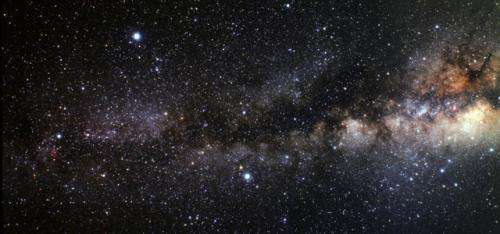Is there intelligent life in the universe? 5 questions with astrobiologist Caleb Scharf

Nicolaus Copernicus, the 16th century Polish astronomer and mathematician, wasn't the first to suggest that the Earth wasn't the center of the universe—the idea originated with the ancient Greeks—but he was the first to prove it with a mathematical theorem. By doing so he upended the notion that Earth is unique, giving rise to the idea that there might be life on other planets.
Astrobiologist Caleb Scharf tackles this complex topic in his newest book, The Copernicus Complex. "I've wondered if we're alone in the universe since I was a child, and everyone I've ever known has thought about it at some point," said the British-born astronomer and physicist, who is director of the Columbia Astrobiology Center.
His research focuses on the study of exoplanets and exomoons, planets and moons outside our own solar system. The center he founded in 2005 includes Columbia faculty from the departments of astronomy, microbiology, climate science, geophysics and astrophysics, and has partnerships with NASA Goddard Institute for Space Studies and the American Museum of Natural History. Its aim is to investigate phenomena related to the origin of life on Earth and on other planets.
The Sunday Times of London just named Scharf's book as its Science Book of the Year. His previous book, Gravity's Engines, about black holes, was listed by New Scientist magazine as one of the 10 books to read in 2012. He is also the author of a popular blog on Scientific American's website called Life, Unbounded.
What do you mean by the "Copernicus Complex?"
It's a phrase that's trying to capture our struggle with one of the biggest questions that we can ask as a species: Are we alone in the universe? Copernican thinking led to the idea that life on Earth, and the Earth itself, aren't special. It's an idea known as cosmic mediocrity, and if that's true, then there has to be lots of other life out there. That was mainstream thinking for a long time.
What have scientists learned that has changed this view?
In the last 20 years we've discovered that planets are pretty much everywhere, which opens up a whole new vista of possibilities. But we've also learned that certain specific conditions must be necessary for life to exist. The question is, what are those conditions, and what are the implications for life's cosmic abundance? In the book I try to reconcile the evidence that suggests planetary life might be common versus the evidence supporting the idea that life on Earth is special and unique. Life equally complex could exist on different planets, but it may have turned out very differently.
Where do you stand on the idea of life on other planets?
There are people out there who really believe in UFOs and humanoid species wandering around in Nevada—if only! I'd put my money on most aliens being microbes, but I think there's complex life too. When we talk about the possibility of technologically intelligent life out there, we're imposing our prejudices on the unknown. Our type of intelligence has only happened once in four billion years on Earth, as far as we know. What if life can be extraordinarily diverse? We could miss a lot simply because it doesn't look familiar. Do I believe there is life on other planets? I'd say yes—we're probably already staring at the right places, but to know for sure we need better data.
How have your research interests changed since you started your career?
I did research on the Big Bang and cosmology for many years. But the discovery of other planetary systems and our expanding knowledge of terrestrial biology helped convince me to switch my research focus. Looking for life in the universe is not easy. It will require a great deal of luck in the next few years. We're looking for life markers in the chemical imbalances of small planets around other stars—that's very difficult. It worries me, and I pace up and down a lot and bite my nails! But it is also exciting, and it pushes our scientific ingenuity to the limits.
Do you think there is something special about Earth and its inhabitants?
At the very end of my book I propose that there is something special about us. We observe, we take notes, but we also have the option to change the equation. We can physically reach beyond our origins. In principle our spacecraft can explore interstellar space, and maybe we can, too. As far as we know, no other species here or elsewhere has had that option—certainly no one's shown up yet. We can actually extend the reach of our species, change the balance of life in the cosmos.
Provided by Columbia University




















